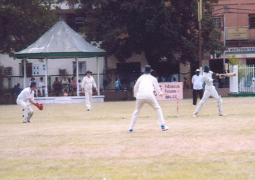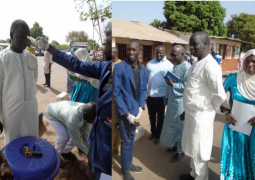They were indicted on a seven-count of unlawful assembly, riot, incitement of violence, riotously interfering with vehicles, holding a procession without a permit, disobeying an order to disperse from an unlawful procession and conspiracy.
When the case was called DPP S.H. Barkun alongside with Deputy DPP M.B. Abubacarr appeared for the state.
Senior Counsel Antouman Gaye led the defence team along with A.N. Bensouda, H.S. Sabally, O.M.M. Njie, R.Y. Mendy, N. Cham, C. Gaye, Yasin Senghore, A. Sissoho, and S.M. Tambadou, among others.
Delivering his ruling, the trial judge said the applicants filed a bail application based on sections 19 and 24 of the constitution of The Gambia and section 99 of the Criminal Procedure Code.
He said the applicants each filed an affidavit in support of the motion.
He said that in response, the DPP filed an affidavit in opposition replying to all the applicants individually.
Justice Ottaba said the applicants’ affidavit in support of the motion stated that the offences charged “are all bailable”, and that they had people who would act as sureties when granted bail.
It also stated that the applicants when admitted to bail would not jump bail or interfere with witnesses or investigations.
The affidavit also stated that some of the applicants have medical problems, while others said that they are breadwinners of their family.
It further stated that the offences are bailable, and urged the court to grant the applicants bail.
They also said the state had charged and brought the applicants to court, which means that the investigation was over.
On the issue of national security, the applicants’ counsel stated that the charges did not state that it had anything to do with national security.
They, therefore, urged the court to exercise its discretion and admit the applicants to bail.
The respondents, the judge went on, in their affidavit in opposition, stated that investigations are still ongoing in the case, and that the applicants might flee the jurisdiction if granted bail.
They also stated that the applicants when released on bail might interfere with witnesses and the investigation, and that “the offences are serious” and concern national security.
It was further stated that there was likelihood that the applicants might commit the offence again.
He also said the state in their affidavit in opposition further stated that going through the affidavit in support, the applicants had woefully failed to convince the court in exercising its discretion.
The fact that “they are sick does not warrant” the court to admit them bail, because “there are medical facilities in prison.”
It also stated that when granted bail they might go ahead with their unlawful protest again.
The state, therefore, urged the court to refuse the bail application.
Replying on points of law, the judge continued, the applicants’ counsel stated that since the applicants are in detention the burden to justify bail could not be placed on them.
The applicants’ counsel, therefore, said the court should consider the presumption of innocence of the accused persons and admit them on bail on reasonable terms.
“It is factual that bail is not a matter of cost or automatic, but it depends on the facts, circumstances and peculiarities of the case,” the judge said.
There was no doubt that the offences the applicants are charged with “touch on the security and peace” of the country.
He added that the charge brought against the applicants was a serious one and, therefore, granting them bail might send a wrong signal to the society.
He added that with regard to the materials before the court, there is a prima facie case against the applicants and that there was a possibility of the applicants jumping bail.
“In view of the facts, circumstances, peculiarities in relation to the nature of the offence, severity of the punishment, likelihood of the offence being committed again and prima facie case against the accused persons, I, therefore, hold that this application lacks merit and hereby dismissed,” the judge announced.
Senior Counsel Gaye then told the court that they wanted to make the same application for the court to stay proceedings on counts 5 and 6, but to save time they want to adopt their application made in the case involving Darboe and 19 others.
However, the DPP objected on the grounds that these are two different instances.
“We agree that the two cases are different even though the charges are the same. We apply for your lordship to stay the application of this case pending the determination of the application in Darboe and Co case,” he said.
The trial judge granted the application, saying the outcome of the ruling on the application for a stay of proceedings on counts 5 and 6 in the Darboe and Co case would determine the next step that would be taken in the case.
The case was then adjourned until 17 May 2016.
Meanwhile, senior Counsel A.N. Bensouda said the court had previously made an order that the prison’s rules should be applied to the accused persons, as they are remand prisoners and not convicts.
She told the court that from the reports coming from their clients, “they are not allowed food from outside and, when they complain about ill-health, they are only given paracetamol.”
“We applied that they be treated like any other remand prisoner and also allowed to exercise their privilege guaranteed by the law. All prisoners have the right, and if the prison authority failed to comply with the court order we are ready to pursue a contempt suit against them.”
The DPP then said there was no need for any other order, because he had confirmed that the previous order of the court was complied with, and said the court could asked the prison officer.
The prison officer, Kalifa Bojang, said that since the order was served to the Director of Prison the accused persons “are given access”.
The trial judge said that it was important to treat the accused persons as innocent until the contrary is proven.
He
said the accused persons should enjoy the rights and privileges within the
rules of the prison.



